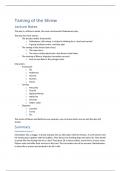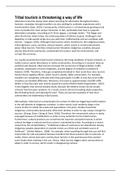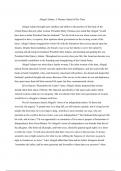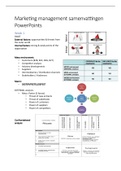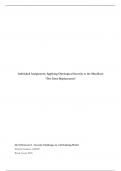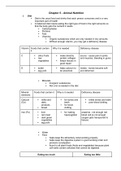8 topics
1. Introduction and instructions assignment
2. What is talent?
3. Talent assessment
4. What is talent management?
5. Outcomes of talent management
6. Ethics of talent management
7. Talent management and cultural contexts
8. Exam preparation / final consult paper
, Preparation 1:
Reading 1: Chambers, et al. (1998). The war for talent.
Research: At a time when the need for superior talent is increasing, big US companies are finding it difficult to
attract and retain good people. In an effort to understand the magnitude of this war for talent, 77 large US companies
were researched. Worked with their HR departments, surveyed top ranked managers from each company, conducted
case studies of talent rich companies, etc.
To win the war for talent, companies have to: make talent management a burning corporate priority, create an
employee value proposition: senior management’s answer to why a smart, energetic, ambitious individual would want to
come and work with you rather than with the team next door, recruit great talent, and develop talent: Put people in jobs
before they’re ready, Put a good feedback system in place, Understand the scope of your retention problem, Move on the
poor performers now.
Lecture 1: Introduction
War for talent: background:
• Economic upturn calls for more personnel - Higher demand for products leads to higher demand
• Declining supply of talent in Western economies (cf. demographic changes) - Less people born = less people later in
productive (work) age; More people to be cared for and produced for (higher life expectancy)
• Increasing market/business complexity, requires ever more sophisticated talent
• Competition of small and medium-sized companies that can offer unique propositions
• Increasing job mobility increases need for retention - job hopping – people change jobs more often than b.
How to win the war for talent ?
• Build a talent mindset - having talent management always on the agenda, making it strategic priority
• Create a superior employee value proposition - make organization attractive for employees
• Create a strong brand image - people want to be part of an organizations with culture they can relate to
• Great talent sourcing strategy - ‘open-day‘ for potential employees, paying tuition fees
• Talent development - Coaching, learning possibilities
As more individual tasks become automatable, jobs are being redefined, re-categorised and revalued. Success in an
automated world will mean people and machines working together, rather than one replacing the other. Exceptional skills
and leadership will be needed through this transformation and beyond.
War for talent: Has this changed?
• Traditional employment relationship: lifelong job in exchange for loyalty → outdated
• New employment relationship: a challenging job, good compensation, and opportunities to learn in exchange for job
performance of employees or contractors → allows for a lot of flexibility for both parties
‘Talent management is ‘an organization’s life line‘.’
The war for talent: some critical remarks
• Focus on key positions (leadership) - sometimes organizations do not have leadership as a key position
• Talent is scare / highly exclusive - However, that only applies for exclusive talent management
• Focus on superior compensation - some people are paid much much more than the others (e.g. CEOs) - to what extent
is this really fair?
• Managing poor performers out of the organization? • Focus on US companies
• Managing talent beyond organizational boundaries: Gig-economy - how do we manage talent not present or directly
‘owned’ by the company? ➔ Also see ethics of talent management
, Preparation 2:
Reading 1: Gallardo-Gallardo, Dries, & González-Cruz (2013). What is the meaning of talent in work?
We can conclude that there is a fundamental lack of consensus as to the meaning of ‘talent’. We offer a
framework for conceptualizing talent within the world of work. Within the world of work talent is conceptualized in two
broad ways—i.e., talent as object versus talent as subject. Within the object approach, talent is conceptualized as
exceptional abilities and attitudes demonstrated by an individual. Talent as natural ability, talent as mastery, talent as
commitment, and talent as fit are to be seen as complementary, rather than supplementary.
Although in the object approach many advocates can be found for a more inclusive, strength-based approach to
talent management, as well, it remains unclear to what extent an inclusive approach to talent makes sense, considering
that the term ‘talent’, inherently—considering its etymology—implies above-average ability or performance. As discussed
in our review, the inclusive and the exclusive subject approach to talent each both have their own merits and drawbacks.
Importantly, we propose that the subject and the object approach to talent can inform each other in that the object
approach specifies which personal characteristics to look for in identifications of talent, whereas the subject approach
provokes important discussions about cut-offs and norms.
Reading 2: Tansley, C. (2011). What do we mean by the term “talent” in talent management?
Findings – Talent management is still in its infancy as a field of study. We need a balanced view of talent as both innate
and learned, with the introduction of ‘‘creativity’’ as a specific element of talent and the importance of the environment
seen as having an influence on the development of talent. There is no single or universal contemporary definition of
‘‘talent’’ in any one language; there are different organizational perspectives of talent. Current meanings of talent tend to
be specific to an organization and highly influenced by the nature of the work undertaken. A shared organizational
language for talent is important. There is a high level of influence of management consultants in the development of the
term in managing people with unique knowledge and skills. Practical implications – Organizational talent, in order that it
can be identified and developed, must be visible, stimulated and nurtured, and the first step to this is to have an agreed
organizational definition of talent. Social implications – Talent management that only recognises a narrow definition of
talent negatively impacts on the full utilization of a nation’s talents.
, Lecture 2: What is talent?
Etymology: Talent timeline - talent was something different each step of humanity
Definition of Talent: According to Merriam Webster
1) a: a special often athletic, creative, or artistic aptitude
b: general intelligence or mental power
2) the natural endowments of a person
Talent in the world of Work: definitions of talent are context- specific
“It appears that talent can mean whatever a business leader or writer wants it to mean, since everyone has his or her own
idea of what the construct does and does not encompass”
Tensions when it comes to defining talent:
1. Object–subject Object - something people have as a skill Subject - something people are
2. Inclusive–exclusive Inclusive - everyone has it
Exclusive - only few have it
Exclusive POV
- “Talent = outstanding mastery of systematically
developed abilities that places an individual at least
among the top 10%.
- Pareto principle: 20% of employees contribute 80%
of the total value
- Someone who is exceptional in their role is not just a
little better than someone who is pretty good... they are 100 times better.“ - Mark Zuckerberg

